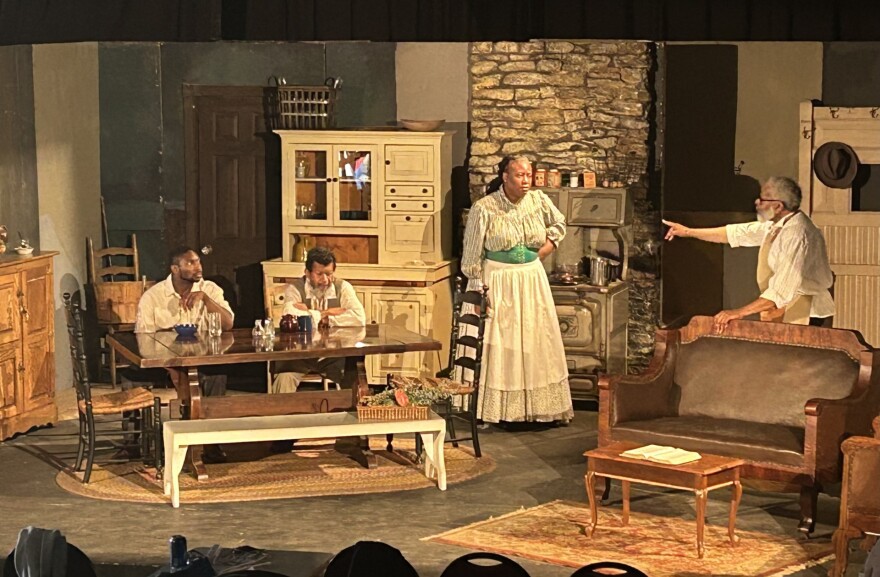This is WESA Arts, a weekly newsletter by Bill O'Driscoll providing in-depth reporting about the Pittsburgh area art scene. Sign up here to get it every Wednesday afternoon.
On the list of only-in-Pittsburgh theater events, seeing an August Wilson play in the backyard of Wilson’s childhood home sits pretty high.
Pittsburgh Playwrights Theatre Co. has staged four of Wilson’s works there since 2016. The current production of “Joe Turner’s Come and Gone” coincides with the first anniversary of the August Wilson House’s grand opening as an arts center.
There’s a special buzz to seeing one of the Pulitzer-winning playwright’s works from his revered Century Cycle — 10 plays about Black life in America, one set in each decade of the 20th century — on the very grounds Wilson himself trod in the Hill District from his birth, in 1945, to age 13. (His family then moved to Hazelwood, but Wilson himself later returned to the Hill before leaving Pittsburgh for good.)
“Joe Turner” is among my own favorites in the Cycle. It’s set in the 1910s, in a Hill District boarding house (though the script namechecks the address of the Wilson House). Proprietors Seth and Bertha Holly host an assortment of guests, mostly notably Herald Loomis, a mysterious, troubled itinerant who’s come from down South with his young daughter to find his long-missing wife.
Many of Wilson’s plays deal explicitly with the legacy of slavery, but given its setting, in “Joe Turner,” the wounds feel especially raw. Loomis, we learn, was a victim of the invidious convict-leasing system that took hold in the Jim Crow era, whereby Black men were arrested on flimsy pretenses and then forced to work in the field or mines for no pay. It was legal slavery by another name.
While Wilson’s plays are never about just one thing, “Joe Turner” is largely dedicated to exploring the damage slavery and its aftermath has wrought on the Black family in particular. It’s full of broken connections and missing people (though you could as easily say “missing connections and broken people”), and suggests that finding (or binding) them is a form of hard-won magic.
The powerful outdoor Playwrights production is directed by Mark Clayton Southers, the company’s founder and a Wilson protégé. The vivid ensemble cast features Kevin Brown, Shaunda Miles McDill, Mike Traylor, and, as Loomis, Roosevelt Watts, Jr.
International regard for the playwright behind “Fences” and “The Piano Lesson,” has, if anything, grown since his death, in 2005. This month, for instance, marks the publication of a new biography of Wilson.
As for the Wilson House, it, too, is moving forward. The building includes gallery and meeting space and a kitchen reconstructed to look as it would have when Wilson lived there.
In addition to an annual April block party marking Wilson’s birthday, the nonprofit hosts school tours and workshops on writing, poetry, and compiling family oral histories. The Art for August program commissions artists to create works inspired by one of Wilson’s plays. Acting chief executive Denise Turner said August in the Schools, a program that employs Wilson’s work to teach oration and playwriting, will soon expand beyond Pittsburgh Public School’s University Preparatory School. A playwriting residency will resume next year, she added.
Currently, a first-floor gallery is home to an exhibit of “Joe Turner”-related artifacts, including drafts of Wilson’s scripts, on loan from the August Wilson Archive, at the University of Pittsburgh.
And performances of “Joe Turner’s Come and Gone” continue through Sept. 9 — but because Playwrights productions of Wilson are perennial favorites, it’s advisable to get tickets early. More information is here.














